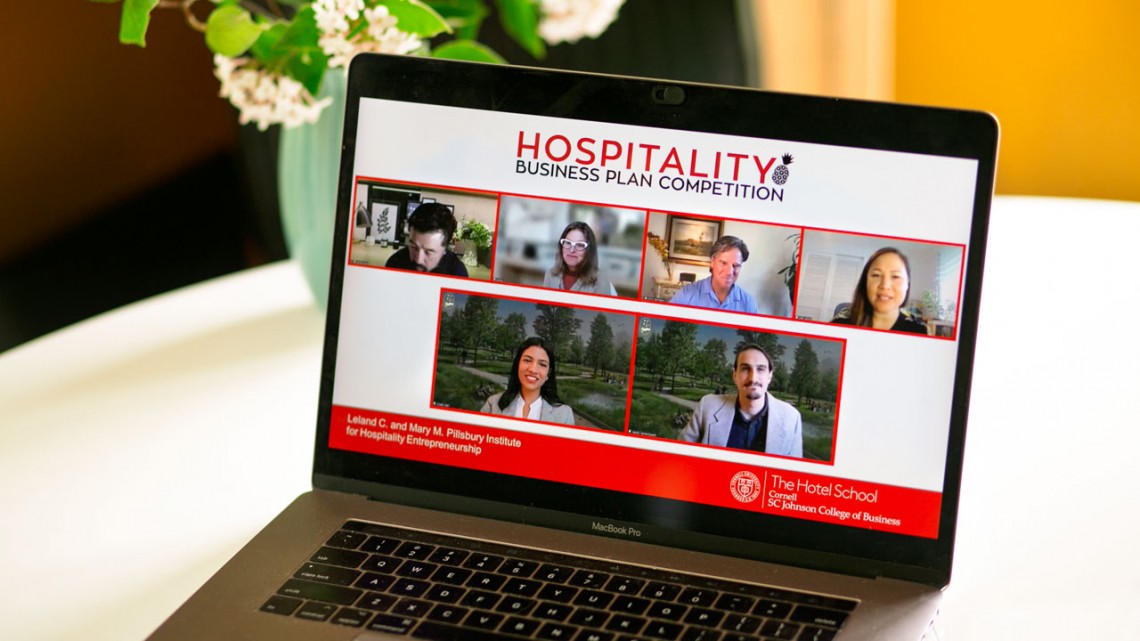
Top row: Industry leaders and alumni judges at the Cornell Hospitality Business Plan Competition, held virtually May 1. Bottom row left to right: Shaily Patil, MPS-RE ’21, and Jacob Tannenbaum, MPS-RE ’21, members of winning team Life After Life.
Green cemetery wins hospitality business pitch contest
By Stephen D’Angelo
A monetization platform connecting consumers to restaurants through influencers’ content and an algorithm-based trip-planning concierge were among the pitches presented during the 11th Cornell Hospitality Business Plan Competition, an annual entrepreneurship event that presents cash prizes for the top three finishers.
Hosted virtually May 1 by the School of Hotel Administration’s (SHA) Pillsbury Institute for Hospitality Entrepreneurship (PIHE), the competition’s $25,000 first prize went to a concept addressing the problem of unaffordable and unsustainable funeral practices in America through conservation cemetery parks.
“We provide the opportunity for a person’s last choice to contribute to the healing of the planet, leaving things better than they came,” said Jacob Tannenbaum, MPS-RE ’21.
Life After Life, represented by Tannenbaum and Shaily Patil, MPS-RE ’21, leverages natural burial conservation cemeteries at the center of new community developments as a tool for ecosystem rehabilitation.
According to the group, cemeteries are regularly abandoned, lowering surrounding property values up to 11%. Further, traditional cemeteries are highly toxic. Green options currently make up only a slight fraction of the $68 billion funeral industry.
Life After Life solves these problems through public-private partnerships, remediating underutilized lands and developing green space using natural burial.
“One thing municipalities all have in common… is a demand for green space,” Tannenbaum said.
The second-place pitch, winning $7,500, focused on repurposing underutilized or distressed hotel assets into affordable, nurturing and flexible independent senior living communities. Team members of Adaptive Reuse Capital included Noah Davis, MMH ’21, Jack Levin, MMH ’21, Jake Lynch, MMH ’21, and Janesh Patel, MMH ’21.
In third place, winning $5,000, was Priya Hospitality, which aims to disrupt Indian cuisine in America through casual restaurant concepts, a portfolio of consumer-packaged goods, and a media production company. Team members included Fareez Dossani, MMH ’21, Jordan Korn, MMH ’21, Chandan Sharma, MMH ’21, and Zachary Zaremba, MPS-RE ’21.
Honorable mentions went to Minwei Cao, MBA ’22, Angad Jaspal ’21, Max Li ’23, Gleb Margolin, MBA ’22, and Peter Nguyen, MBA ’22 for their algorithm-based trip-planning concierge pitch, RunDeVu; as well as Boonyakorn Chandhanayingyong, MPS-RE ’21, Sanjeet Dutta, M.Eng. ’21, Isa Goldberg, MBA ’22, Pete Vejanurug, MBA ’22, and Kevin Wang, MBA ’22, for Crave, a monetization platform connecting consumers to restaurants through social media.
The competition, open to students from across Cornell, is a program of the Leland C. and Mary M. Pillsbury Institute for Hospitality Entrepreneurship. Beginning at the start of the academic year, students form teams and develop pitches for their business ideas. The field is narrowed down to 10 semifinalist teams, who submit full business plans. Five teams from that group are then chosen to go to the finals, where they make their presentations to a panel that selects three winners.
“This program gives students an amazing opportunity to prepare and pitch a business idea to real venture capitalists and successful entrepreneurs, but in an educational and supportive environment, where the goal is for the students to hone their skills and refine their pitches,” said Linda Canina, academic co-director at PIHE and professor of finance at SHA. “It’s rather like being in the shark tank without the risk of being eaten alive – no failure or rejection, only opportunities to learn from the best and improve.”
As they develop ideas, teams are guided by entrepreneurs, alumni, faculty and industry partners. “Nowhere else can students get so much valuable face time with industry mentors, and nowhere else are industry mentors so dedicated to the students’ success,” Canina said.
Meli James ’00, co-founder of Mana Up, president of Hawaii Venture Capital Association and PIHE’s Entrepreneur in Residence, spent the year mentoring, guiding and coaching the teams.
“In my experience the coachability factor is a key indicator for success,” said James, also a competition judge. “The students have been very open to feedback and digging in to additional research and customer discovery to flesh out any gaps in their business assumptions.”
Stanley Sun ’00, MBA ‘05, deputy chairman and chief executive officer, China-Hongkong Photo Products Holdings Limited, is a longtime sponsor of the competition, who participated this year as a judge.
“There are many business case competitions among the university, but what makes this one unique is the fact that it has hospitality foundations, which builds on our school strength,” Sun said.
A recording of the Cornell Hospitality Business Plan Competition can be viewed online.
Stephen D’Angelo is a writer and content strategist with the Cornell SC Johnson College of Business.
Media Contact
Get Cornell news delivered right to your inbox.
Subscribe
